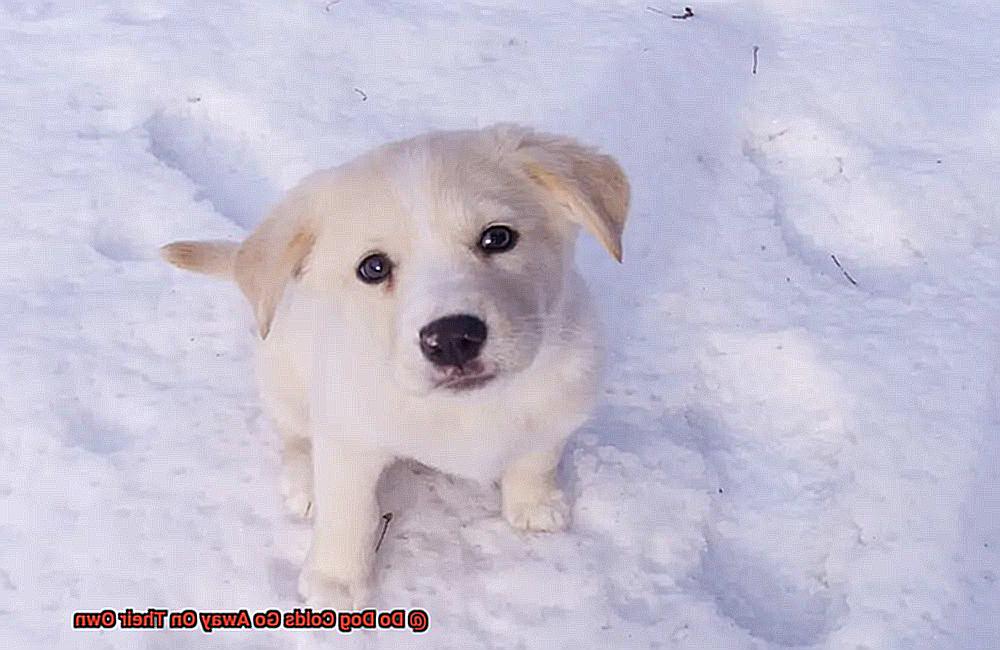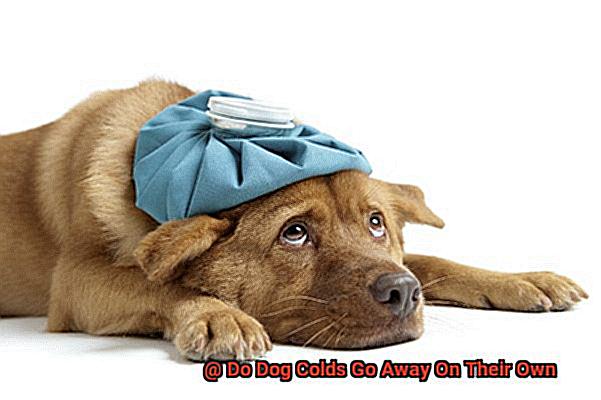Do Dog Colds Go Away On Their Own?
Picture this: your furry friend lets out an adorable sneeze that melts your heart. But amidst the cuteness, a nagging question arises – do dog colds magically disappear like a vanishing act? Well, get ready to embark on an enlightening journey as we unravel this puzzling canine conundrum. We’ll provide you with all the insights you need to ensure your four-legged pal stays in tip-top health.
We humans often brush off our own colds, hoping that time alone will cure those pesky sniffles and sneezes. But can our resilient canine companions rely on the same self-resolving powers? Let’s dive deep into their unique immune systems, exploring potential complications and treatment options along the way.
So grab yourself a steaming cup of coffee, wrap yourself in a cozy blanket, and join us on this epic quest to uncover whether our furry friends can simply sneeze their way back to optimal health. Get ready for some pawsitively fascinating discoveries. Let’s get started.
Causes and Symptoms of Dog Colds
Contents
- 1 Causes and Symptoms of Dog Colds
- 2 How Long Does a Dog Cold Last?
- 3 Natural Remedies for Dog Colds
- 4 Isolation and Prevention of Dog Colds
- 5 When to See a Vet for a Dog Cold?
- 6 The Pros and Cons of Treating a Dog Cold at Home
- 7 Common Complications of Untreated Dog Colds
- 8 How to Care for Your French Bulldog with a Cold
- 9 Conclusion
French bulldogs are unique and beloved pets known for their adorable snorts and snuggly personalities. But just like us, they can catch a cold too. In this article, we’ll explore the causes and symptoms of dog colds, also known as canine infectious respiratory disease complex (CIRDC) or kennel cough. So, grab a cup of tea and let’s dive into the world of dog sniffles.
Causes of Dog Colds:
Dog colds are commonly caused by viruses such as canine parainfluenza virus, canine adenovirus type 2, and canine distemper virus. These viruses attack the respiratory system, causing inflammation and irritation in the airways. Bacteria like Bordetella bronchiseptica can also contribute to the development of dog colds.
Symptoms of Dog Colds:
Just like when we catch a cold, our furry friends may exhibit various symptoms when they have a dog cold. Here are some common signs to look out for:
- Persistent Coughing: Your French bulldog may develop a dry, hacking cough that sounds like honking or gagging. This cough can persist for several weeks and may be triggered by excitement or exercise.
- Sneezing and Nasal Discharge: Like us, dogs with colds may experience sneezing fits and a runny nose. Initially, the nasal discharge may be clear, but it can become thicker and yellowish if a secondary bacterial infection occurs.
- Lethargy and Reduced Appetite: If your French bulldog is feeling under the weather, they may exhibit reduced energy levels and overall lethargy. You may notice that they are less interested in their usual activities, including eating.
- Watery Eyes: The inflammation in the respiratory system can affect the nearby tear ducts, causing watery or teary eyes in some dogs with colds.
- Mild Fever: In certain cases, your furry friend may experience a mild increase in body temperature, although this symptom is not always present.
Conclusion:
Dog colds, or CIRDC, can make our French bulldogs feel less like their usual vibrant selves. It’s important to monitor their symptoms and provide the appropriate care to prevent complications. While most dog colds will resolve on their own within 1 to 3 weeks, it’s crucial to consult a veterinarian for an accurate diagnosis and proper treatment. So, keep an eye out for those sniffles and sneezes, and let’s help our furry friends get back to their playful selves in no time.
How Long Does a Dog Cold Last?
French bulldogs, with their unique short-nosed anatomy, can be more susceptible to respiratory infections. As pet parents, it’s essential to understand the typical duration of a dog cold and how we can help our furry friends recover faster. In this guide, we’ll explore the duration of a dog cold and provide practical tips to aid in your French bulldog’s recovery.
The Duration of a Dog Cold:
Most dog colds, including canine infectious respiratory disease complex (CIRDC), last for about 7 to 14 days. However, every dog is different, and the duration may vary depending on factors such as overall health, severity of infection, and treatment provided. It’s important to note that some dogs may experience symptoms for a shorter or longer period.
Recognizing Symptoms:
During the initial stages of a dog cold, you may notice symptoms such as sneezing, coughing, nasal discharge, and lethargy. These symptoms may worsen over time before gradually improving. Keep a close eye on your French bulldog and monitor their symptoms carefully.
Helping Your French Bulldog Recover Faster:
While dog colds often resolve on their own within a couple of weeks, there are ways to help speed up your furry friend’s recovery:
- Rest: Ensure your French bulldog gets plenty of rest during their illness. Limit physical activity and provide a quiet and comfortable space for them to relax.
- Balanced Diet: Offer a balanced and nutritious diet to support your dog’s immune system. Consult with your veterinarian for diet recommendations during their illness.
- Hydration: Provide access to clean water at all times to keep your dog hydrated. This helps thin nasal secretions and prevents dehydration.
- Warm Environment: Keep your French bulldog in a warm and comfortable environment, especially if they have a fever. Avoid drafts and provide extra blankets if needed.
- Veterinary Consultation: If your French bulldog’s symptoms worsen or persist beyond the usual duration, consult a veterinarian for a proper diagnosis and treatment plan. Professional guidance is crucial, especially for brachycephalic breeds like French bulldogs.

Remember, avoid giving your dog any human over-the-counter medications without veterinary guidance, as they can be harmful or ineffective.
Natural Remedies for Dog Colds
Just like us, our furry friends can catch a cold. But fear not. With the right natural remedies, you can help your French Bulldog recover faster and get back to their playful selves.
In this guide, we’ll explore some tried-and-true remedies that will have your Frenchie feeling better in no time.
Rest and Comfort:
Give your pup plenty of rest in a cozy, warm environment. Just like us, dogs need time to heal when they’re sick. Create a comfortable spot for them to snuggle up and recover.
Hydration is Key:
Ensure your Frenchie stays hydrated throughout their cold. Fresh water should always be available, but consider offering warm broth or diluted chicken soup to entice them to drink if they’re not feeling well.
Soothe with a Humidifier:
Adding a humidifier to the room where your Frenchie spends most of their time can help soothe their respiratory system and relieve congestion. This extra moisture in the air can ease dry coughs and irritated nasal passages.
Immune-Boosting Supplements:
Consult with your veterinarian about incorporating immune-boosting supplements into your Frenchie’s diet. Vitamin C, echinacea, and garlic are known for their immune-strengthening properties.
Honey can soothe a sore throat and suppress coughing, while coconut oil contains lauric acid, which has antimicrobial properties. These natural remedies may help alleviate symptoms and support your Frenchie’s recovery.
Herbal Soothers:
Chamomile tea or peppermint tea can be used to soothe your Frenchie’s throat and reduce inflammation. Just make sure the herbs are safe for dogs, as some plants can be toxic to them.
Cleanliness is a Must:

Regularly clean your Frenchie’s living area, including bedding and toys, to prevent the spread of germs and bacteria that could worsen their cold or prolong their recovery.
Nutrient-Rich Diet:
A balanced diet rich in nutrients will help strengthen your Frenchie’s immune system overall. Opt for high-quality food that includes essential vitamins and minerals to support their body in fighting off infections.
Remember, while these natural remedies can provide relief for mild cases, it’s always best to consult with a veterinarian if your Frenchie’s symptoms worsen or persist for an extended period. Your veterinarian will provide the best guidance based on your Frenchie’s individual needs.
So, grab a warm cup of tea (for yourself, of course.) and give your French Bulldog the love and care they deserve during their cold. With these natural remedies, your furry friend will be back to their spunky selves in no time.
Isolation and Prevention of Dog Colds
As a fellow lover of these adorable pups, I understand how important it is to keep our furry friends healthy and happy. One common concern among dog owners is the prevention and management of dog colds. In this article, we will explore the importance of isolation and prevention measures for managing and controlling dog colds, helping you keep your French Bulldog in top shape.
Isolation: Keeping the Colds at Bay
Isolation is crucial when dealing with dog colds. These pesky infections can spread like wildfire, so keeping infected dogs away from others is essential. Voilà, here are some tips to help you create a safe space for your sick pup:
- Separate Space: If possible, designate a specific room or area for your infected dog to minimize contact with other dogs.
- Limited Social Interactions: Keep your pup away from other dogs during the duration of their cold. Avoid places like dog parks or daycare facilities where there’s a high concentration of furry friends.
- Cross-Contamination Prevention: Separate food and water bowls, toys, and bedding between infected and healthy dogs to prevent cross-contamination.
- Hygiene Practices: Maintain proper hygiene when handling your sick pup. Wash your hands thoroughly after contact and disinfect surfaces regularly.

Prevention: An Ounce of Paw-vention is Worth a Pound of Cure
Preventing dog colds is as important as managing them. Here are some paw-some prevention measures to keep in mind:
- Vaccinations: Stay up to date with your French Bulldog’s vaccinations to protect against respiratory infections like kennel cough, a common cause of dog colds.
- Vet Check-Ups: Regular vet check-ups can help identify any potential health issues early on and ensure your pup’s vaccinations are current.
- Clean Living Environment: Keep your pup’s living space clean and hygienic. Regularly clean and disinfect surfaces, floors, crates, and toys to eliminate potential sources of infection.
- Good Nutrition: A balanced diet with proper nutrients can boost your French Bulldog’s immune system, making them less susceptible to dog colds.
When to See a Vet for a Dog Cold?
That’s why it’s crucial to know when it’s time to seek veterinary care for a dog cold. In this article, I’ll provide you with comprehensive insights and expert advice on when it’s necessary to take your French Bulldog to the vet for a cold.
Persistent Symptoms:
If your Frenchie’s cold symptoms persist for more than a week or worsen over time, it’s time to consult a vet. Watch out for persistent coughing, nasal discharge, sneezing, or difficulty breathing. These signs may indicate an underlying bacterial infection or a more serious respiratory condition that needs medical intervention.
High Fever:
Dogs with colds may develop a mild fever, but if their temperature exceeds 103°F (39.4°C), it’s recommended to seek veterinary attention. A high fever can be a sign of a secondary infection or other underlying health issues.
Lack of Appetite or Dehydration:
A significant decrease in appetite or refusal to eat altogether is cause for concern. Loss of appetite can lead to dehydration, compromising the immune system and prolonging the recovery process. Consult a vet if your Frenchie shows signs of decreased appetite or dehydration.
Severe or Worsening Symptoms:
If your Frenchie experiences severe symptoms like difficulty breathing, wheezing, lethargy, or coughing up blood, immediate veterinary care is essential. These signs may indicate a more severe respiratory condition or complications that require prompt treatment.
Pre-existing Health Conditions:
French Bulldogs with pre-existing health conditions such as heart disease, respiratory disorders, or compromised immune systems are at higher risk of developing complications from a dog cold. Consult a vet to ensure proper management and prevent potential complications.
Young Puppies or Senior Dogs:
Puppies under six weeks old and senior Frenchies with weakened immune systems are more vulnerable to respiratory infections. Seek veterinary care promptly to prevent the infection from worsening and causing severe health issues.
While most dog colds will resolve on their own with proper care and rest, it’s crucial to closely monitor your Frenchie’s symptoms. Remember, your veterinarian is your best ally in ensuring your pup’s well-being.
They can provide an accurate diagnosis, recommend appropriate treatment options, and offer guidance on how to support your Frenchie’s recovery. So, when in doubt, don’t hesitate to reach out to your vet. Your furry friend will thank you for it.
Stay tuned for our next article, where we’ll explore isolation and prevention measures to keep your French Bulldog healthy and happy.
The Pros and Cons of Treating a Dog Cold at Home
When your beloved French bulldog is feeling under the weather with a cold, you may be wondering if treating them at home is the right choice. While there are some benefits to treating a dog cold at home, it’s important to weigh them against the potential drawbacks. Let’s take a closer look at the pros and cons.
Pros of Treating a Dog Cold at Home:
- Comfort and Familiarity: Dogs thrive in familiar environments, and being at home can help reduce their stress and anxiety, which aids in the healing process.
- Cost-Effectiveness: Veterinary treatments can be expensive, but by treating your dog at home, you can save money on consultation fees, medications, and other related expenses.
- Readily Available Remedies: Simple home remedies like humidifiers, warm compresses, and steam therapy can be easily implemented without veterinary intervention.
- Close Monitoring: Treating your dog at home allows you to closely monitor their progress, observe any changes in symptoms, and make adjustments as needed.
Cons of Treating a Dog Cold at Home:
- Misdiagnosis or Inadequate Treatment: Without professional guidance, it can be challenging to accurately determine the underlying cause of your dog’s symptoms, potentially leading to ineffective treatments or a worsened condition.
- Delayed Professional Treatment: In severe cases or when symptoms persist, seeking veterinary care is crucial to prevent complications or secondary infections that may require more extensive interventions.
- Suitability and Safety of Home Remedies: Some home remedies may not be suitable for all dogs or could interact negatively with existing medical conditions or medications. Consultation with a veterinarian is essential before administering any home treatments.
- Time and Effort Commitment: Treating a dog cold at home requires dedication and extra care, such as administering medications and monitoring their temperature regularly.
Common Complications of Untreated Dog Colds
We all know how much we love our furry friends, and we want to keep them happy and healthy. Unfortunately, just like humans, dogs can catch a cold too. And just like with us, it’s important to treat their colds promptly to avoid any complications. In this article, we’ll discuss the common complications that can arise from leaving a dog cold untreated, specifically focusing on our beloved French Bulldogs.
- Secondary infections: When a dog’s immune system is weakened by a cold, it becomes more susceptible to other infections. This can include bacterial infections like pneumonia or viral infections like canine influenza. These secondary infections can be more severe and difficult to treat than the initial cold.
- Prolonged respiratory symptoms: If your French Bulldog’s cold is left untreated, those pesky respiratory symptoms can stick around for longer. Imagine your Frenchie still coughing, sneezing, and struggling to breathe for an extended period. Not only is it uncomfortable for them, but it can also affect their overall quality of life.
- Development of chronic respiratory conditions: Untreated dog colds can lead to long-term damage in the respiratory system, potentially resulting in chronic conditions like bronchitis or COPD. Our French Bulldogs are already prone to respiratory issues due to their short snouts, so it’s crucial to address their colds promptly to minimize the risk of developing these chronic conditions.
- Weakened immune system: A strong immune system is vital in fighting off infections and illnesses. However, if your Frenchie’s cold is left untreated, their immune system may become compromised. This makes them more vulnerable to future diseases and infections. We definitely don’t want our fur babies falling sick more often.
- Discomfort and reduced appetite: Can you imagine how uncomfortable it would be for your French Bulldog to have a sore throat, headache, body aches, and just feeling generally unwell? Untreated dog colds can cause all these discomforts, leading to a reduced appetite. This not only weakens their immune system further but also hinders their recovery.
- Spread of illness to other dogs: French Bulldogs are social animals, and they love going to the dog park or boarding facilities to play with their buddies. However, if your Frenchie has a cold and is not isolated or treated promptly, there is a risk of spreading the illness to other dogs. Dog colds can be contagious, so it’s crucial to take precautionary measures and prioritize the health of all dogs involved.
In conclusion, untreated dog colds can lead to various complications that can affect our French Bulldogs’ health and well-being. As responsible pet owners, it’s our duty to seek veterinary care and provide appropriate treatment to help our furry friends recover and prevent further complications.
How to Care for Your French Bulldog with a Cold

French Bulldogs are adorable and affectionate pets, but their brachycephalic (short-nosed) features make them prone to respiratory issues, including colds. If your furry friend is feeling under the weather, it’s important to provide them with the proper care and support to help them feel better. In this article, we will explore some simple yet effective ways to care for your French Bulldog with a cold.
Keep Your Frenchie Warm and Cozy:
Just like us, dogs love to be comfortable when they’re not feeling well. Set up a cozy bed or blanket in a warm, draft-free area for your French Bulldog to rest. Avoid exposing them to cold temperatures and keep them indoors until they’ve fully recovered.
Hydration is Key:
Staying hydrated is crucial for dogs with a cold. Make sure your French Bulldog has access to fresh water at all times. To entice them to drink more, consider offering warm broth or diluted chicken soup, which can also help soothe their throat.
Nourishing Meals:
When dogs have a cold, their appetites may decrease. Offer small, easily digestible meals throughout the day and consider adding extra protein and vitamins to boost their immune system. Avoid giving them spicy or greasy foods that might irritate their throat.
Relieve Nasal Congestion:
Nasal congestion is a common symptom of a cold in dogs. Use a humidifier or vaporizer in the room where your French Bulldog spends most of their time to keep the air moist and make breathing easier for them. You can also use saline nasal drops or sprays specifically formulated for dogs to help clear their nasal passages.
Monitor Symptoms Closely:
Keep a close eye on your French Bulldog’s symptoms and overall condition. If symptoms worsen or persist for more than a few days, it’s crucial to seek veterinary care. Your vet may prescribe medications such as antibiotics or cough suppressants if necessary.
Isolate Your Frenchie:
Colds in dogs can be contagious, so it’s important to isolate your French Bulldog from other pets while they’re recovering. This will prevent the spread of the illness and protect other animals in your household.
Caring for your French Bulldog with a cold involves providing them with warmth, hydration, nourishing meals, and a clean environment. Remember to monitor their symptoms closely and seek veterinary care if necessary. With your love and proper care, your furry friend will be back to their happy and healthy self in no time.
Conclusion
Dog colds, just like human colds, are usually self-limiting and will go away on their own.
It’s important to remember that dogs have immune systems too, and they are capable of fighting off common respiratory infections. While it may be tempting to rush your furry friend to the vet at the first sign of a sniffle, it’s often unnecessary.
Most dog colds will resolve within a week or two without any intervention. However, if your dog’s symptoms persist or worsen, it’s always best to consult with a veterinarian for proper diagnosis and treatment.
Keeping your pup’s immune system strong through regular exercise, a balanced diet, and vaccinations can help reduce the risk of them catching a cold in the first place.




